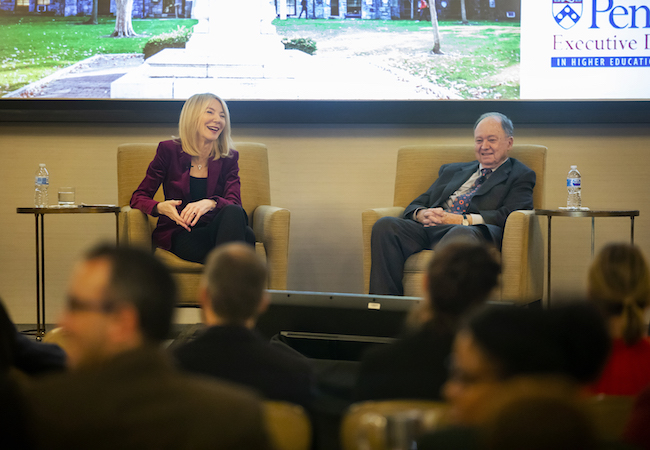To improve higher ed, talk tough conversations and encourage innovative outlook

Penn President Amy Gutmann and Graduate School of Education scholar Robert Zemsky participated in a “fireside chat,” part of the 15th Higher Education Leadership Conference, which each year boasts an alumni-run mixture of panels, keynote speakers, and faculty presentations. (Eric Sucar, University Communications)
Gazing out at a crowd of Graduate School of Education alumni at the Inn at Penn Thursday afternoon, Robert Zemsky could recognize just about every person in the room. In fact, he had taught the majority of them—all part of the Executive Doctorate in Higher Education Management program.
Zemsky, a renowned educational researcher and author, and a professor at the University for more than five decades, helped envision the fast-paced, intensive two-year doctorate program, catered specifically for senior working professionals. Today, after nearly 20 years, the program’s alumni have game-changing careers, including deanships at universities to policy advisees for the U.S. Congress. More than 45 alumni of the program have gone on to become college presidents.
“I know all of you, I really do,” said Zemsky to his former students, while participating in a “fireside chat” with Penn’s own President Amy Gutmann. “A lot of you are at institutions that are looking at uncertain futures. Not grim futures, but uncertain.”
Gutmann, who has served as Penn’s leader since 2004, has been published widely on the value of education and deliberation in democracy, relating closely to the conversation she had with Zemsky on breaking boundaries to ensure a stronger future for higher education. Their talk—introduced by Penn GSE Dean Pam Grossman—was part of the 15th annual Higher Education Leadership Conference, which each year boasts a mixture of executive Ed.D. alumni-run panels, keynote speakers, and faculty presentations.
Zemsky began the conversation by asking Gutmann a pretty broad question about her work, and her role: “Are you having a good time?”
“The fact is, I love my job,” said Gutmann. “It’s not a job, it’s a calling, and it’s a calling that gets me up every morning. If I didn’t love it, frankly I couldn’t do it.”
Zemsky pressed, still, asking if it’s a more stressful time in higher education than before.
“Higher education is under assault, there’s no doubt about it,” Gutmann said. “However higher education … has never been more diverse in the history of the world. We’re educating women and minorities who before never had an opportunity to do that. And we need to appreciate that. It is worth the stress. Stress has to be calibrated against what our mission is.”
